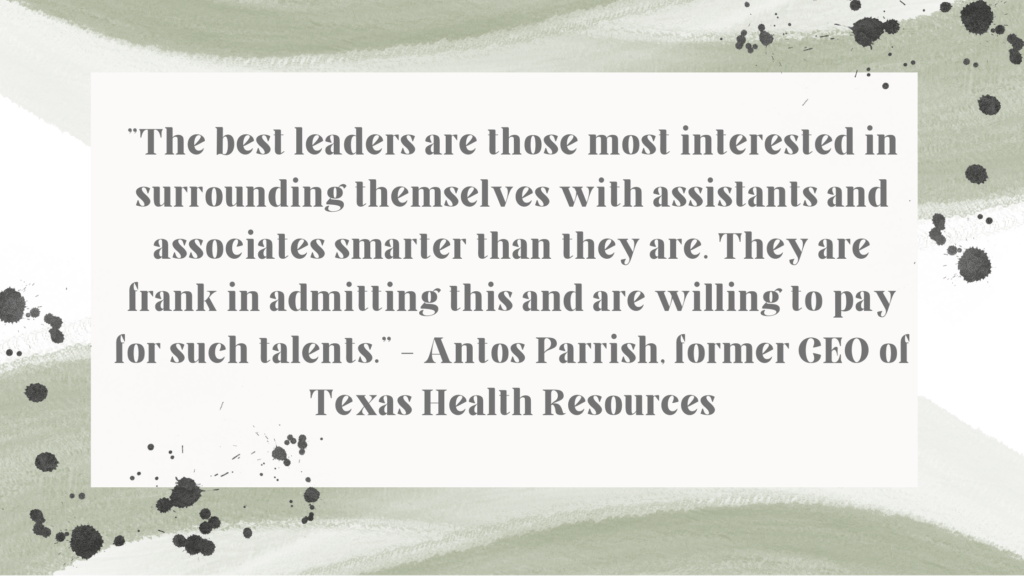Table of Contents
At the heart of every successful healthcare organization is a strong and effective leadership team. A great leader can set the tone for the entire organization, inspire their team, and ultimately drive better patient outcomes. In today's rapidly changing healthcare landscape, it is more important than ever to have strong healthcare leadership.
In this article, we will discuss the crucial role that strong healthcare leadership plays in creating a successful healthcare organization. We will explore the characteristics of effective healthcare leaders and discuss how their leadership can improve patient outcomes, employee satisfaction, and organizational success.

Why Strong Healthcare Leadership Matters
Strong healthcare leadership is critical to achieving success in healthcare organizations. The healthcare industry is complex and constantly evolving, and a great leader can help their team navigate these changes while keeping the focus on providing the best possible patient care. Effective healthcare leaders can drive innovation, improve patient outcomes, and create a positive and fulfilling work environment for their employees.
Effective Healthcare Leaders: Characteristics and Qualities
Successful healthcare leaders possess a range of qualities that enable them to be effective in their roles. Some of these qualities include:
- Vision: Effective leaders have a clear vision for the organization, and are able to communicate this vision to their team members.
- Communication: Communication is key to effective healthcare leadership. Great leaders are able to communicate clearly and effectively with their teams, ensuring that everyone is on the same page and working toward the same goals.
- Flexibility: The healthcare industry is constantly changing, and leaders need to be able to adapt to these changes quickly. They need to be able to pivot their strategy and adjust their plans as needed.
- Integrity: Great healthcare leaders lead by example, and they hold themselves and their teams to the highest ethical standards. They do what is right, even when it is difficult.
- Emotional Intelligence: Leaders who possess emotional intelligence are better able to understand and empathize with their team members, which helps to create a positive work environment.
- Resilience: Healthcare leaders must be able to handle stress and adversity, and be able to bounce back from setbacks.
- Strategic Thinking: Leaders who are able to think strategically are better able to make informed decisions and set the direction of the organization.
- Adaptability: Healthcare leaders must be able to adapt to change and be flexible in their approach to problem-solving.
Creating a Positive Workplace Culture
Effective healthcare leaders understand the importance of creating a positive workplace culture. They understand that a positive work environment can help to improve employee satisfaction and retention rates, which ultimately leads to better patient care. Leaders who value their employees and treat them with respect are more likely to have a happy and engaged workforce.
To create a positive workplace culture, healthcare leaders must prioritize communication and transparency. They should be open and honest with their team members, and encourage a culture of collaboration and teamwork. Leaders who prioritize the well-being of their employees create a positive work environment, where team members feel valued and supported.
Driving Better Patient Outcomes
Strong healthcare leaders play a crucial role in driving better patient outcomes. They are responsible for setting the direction of the organization and ensuring that it is aligned with the needs of the patients. Effective leaders are able to create a culture of patient-centered care, where the focus is on providing the best possible outcomes for each patient.
To achieve this, healthcare leaders must prioritize quality and safety. They must ensure that their team members have the resources they need to deliver high-quality care, and that they are following best practices to ensure patient safety. Leaders who prioritize patient outcomes create a culture of excellence, where the focus is on continuous improvement and delivering the best possible care to every patient.

organizations for long-term success. In today's rapidly changing healthcare landscape, it is more important than ever to have strong and effective healthcare leadership.
While the importance of strong healthcare leadership is clear, many organizations struggle to find and develop great leaders. One reason for this is that the skills and qualities that make a great healthcare leader are not always easy to identify or measure. Additionally, many healthcare organizations focus more on clinical skills and experience, rather than leadership skills, when hiring and promoting employees.
To address this issue, healthcare organizations should prioritize leadership development and invest in programs that help employees develop the skills and qualities necessary to become great leaders. This can include training programs, mentorship opportunities, and leadership coaching.
It is also important for healthcare organizations to prioritize diversity and inclusion in their leadership teams. Research has shown that diverse teams are more innovative, make better decisions, and ultimately perform better than homogeneous teams. By prioritizing diversity and inclusion, healthcare organizations can improve patient outcomes and position themselves for long-term success.
In conclusion, strong healthcare leadership is essential to the success of healthcare organizations. Effective healthcare leaders possess a unique set of qualities and skills that enable them to drive innovation, improve patient outcomes, and create a positive and fulfilling work environment. Healthcare organizations should prioritize leadership development and diversity and inclusion to ensure they have the strong leaders they need to succeed in today's rapidly changing healthcare landscape.
Conclusion
In conclusion, strong healthcare leadership is critical to the success of healthcare organizations. Effective healthcare leaders possess a unique set of qualities that enable them to lead their teams to success. They create a culture of patient-centered care, encourage innovation, and prioritize employee engagement and satisfaction. By doing so, they can improve patient outcomes, reduce costs, and position their
With patient safety as their top priority, They inspire and uplift with humility. Empowering their team to do their best, To serve with passion and never rest.
Shaynly
FAQ's
- What are the qualities of a strong healthcare leader?
A strong healthcare leader possesses a unique set of qualities that enable them to drive innovation, improve patient outcomes, and create a positive and fulfilling work environment. These qualities include strong communication skills, strategic thinking, the ability to inspire and motivate others, a commitment to lifelong learning, and a deep understanding of the healthcare industry.
- How can healthcare organizations identify and develop great leaders?
Healthcare organizations can identify and develop great leaders by prioritizing leadership development programs and investing in training, mentorship, and coaching opportunities. They can also look for employees who possess the qualities and skills necessary to become great leaders, and provide them with the resources and support they need to succeed.
- Why is diversity and inclusion important in healthcare leadership?
Diversity and inclusion are important in healthcare leadership because they help to improve patient outcomes, drive innovation, and create a positive and fulfilling work environment. Research has shown that diverse teams make better decisions and are more innovative than homogeneous teams, and that organizations that prioritize diversity and inclusion are more likely to achieve long-term success.
- How can leadership development programs benefit healthcare organizations?
Leadership development programs can benefit healthcare organizations by helping to identify and develop great leaders, improving employee morale and retention, driving innovation and improving patient outcomes, and ultimately positioning the organization for long-term success. By investing in leadership development programs, healthcare organizations can build a strong and effective leadership team that is equipped to navigate the rapidly changing healthcare landscape.
- What is the role of healthcare leadership in driving innovation and improving patient outcomes?
Healthcare leadership plays a critical role in driving innovation and improving patient outcomes by providing the strategic direction and support necessary to implement new technologies and practices. Effective healthcare leaders also prioritize quality improvement and patient safety, and are committed to continuous learning and improvement.
- What challenges do healthcare leaders face in today's rapidly changing healthcare landscape?
Healthcare leaders face a range of challenges in today's rapidly changing healthcare landscape, including managing complex and evolving regulatory requirements, balancing cost containment with quality improvement, addressing workforce shortages and burnout, and managing the impact of new technologies and changing patient expectations.
- How can healthcare organizations measure the effectiveness of their leadership development programs?
Healthcare organizations can measure the effectiveness of their leadership development programs by tracking key performance indicators such as employee satisfaction, retention rates, and patient outcomes. They can also conduct regular assessments and surveys to gather feedback and identify areas for improvement.
- What strategies can healthcare leaders use to create a positive and fulfilling work environment for their employees?
Healthcare leaders can create a positive and fulfilling work environment for their employees by prioritizing employee engagement and recognition, promoting work-life balance and flexibility, fostering a culture of learning and growth, and providing opportunities for professional development and career advancement.
- What are some common mistakes healthcare organizations make when it comes to leadership development?
Some common mistakes healthcare organizations make when it comes to leadership development include focusing too heavily on clinical skills and experience, neglecting diversity and inclusion, and failing to provide adequate support and resources for leadership development. It is important for healthcare organizations to prioritize leadership development and invest in programs that help employees develop the skills and qualities necessary to become great leaders.
- How can healthcare leaders stay up-to-date on the latest trends and developments in their field?
Healthcare leaders can stay up-to-date on the latest trends and developments in their field by participating in professional development opportunities such as conferences, webinars, and industry events, networking with other healthcare professionals, and staying current on the latest research and publications in their field. They can also engage with their employees and encourage a culture of continuous learning and improvement.

